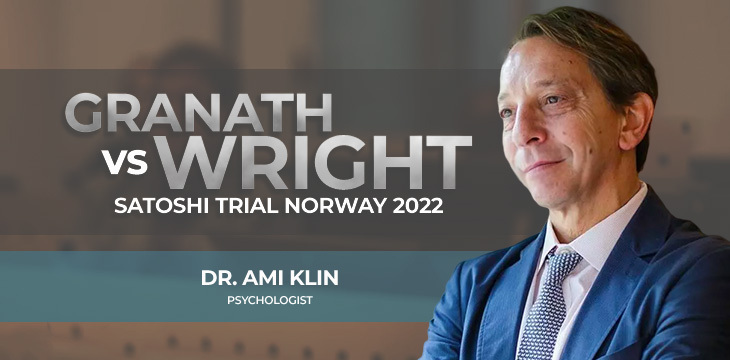|
Getting your Trinity Audio player ready...
|
Dr. Craig S. Wright was diagnosed with an autism spectrum disorder in 2020. Knowing this probably won’t change anyone’s mind about his role in Bitcoin history, but it does help explain why others’ accusations have resulted in lawsuits. As part of the recent defense against Marcus “Hodlonaut” Granath at the Oslo District Court in Norway, autism expert Dr. Ami Klin gives a personalized explanation of how things turned out this way.
Dr. Klin has 30 years of experience with autism research and clinical treatment. He serves as Director of the Marcus Autism Center, Children’s Healthcare of Atlanta, and is a Georgia Research Alliance Eminent Scholar Professor.
Unlike most of the witnesses called, Dr. Klin does not directly address the question of whether Dr. Wright invented Bitcoin. Instead, his testimony explains Wright’s personality and behavior in court—something Dr. Klin says he does because his clients’ autism tends to get them into trouble in high-stress situations like a courtroom. More than once, he complimented the Norwegian justice system for providing a comparatively relaxed environment.
Dr. Klin diagnosed Dr. Wright with autism spectrum disorder in early 2020 after a series of lengthy interviews with Wright’s family and Wright himself. It’s unusual to have the first diagnosis of this type so late in life, he says, though this is probably due to spectrum disorders becoming more recognized in more people in recent decades. Most people, he says, would go through life simply wondering what’s wrong with them.
Much has been said and written about Dr. Wright’s personality; in fact, it is part of the reason he’s become a target for the kind of online abuse at the heart of the Hodlonaut and McCormack cases. Granath referred to Dr. Wright as “pathetic,” a “loser,” and “mentally ill” in his tweets. These comments hit Dr. Wright particularly hard, especially after his autism diagnosis.
Dr. Klin stresses that developmental disorders (like autism) are different from mental illnesses. In the latter case, sufferers may lose touch with reality. However, this is not the case in individuals with autism. He also points out that autism and narcissistic personality disorder are entirely different things and that individuals with autism frequently cannot manipulate others with deception, given their reduced ability to perceive the personality cues a manipulator would target.
“The world of things is a world that is predictable. If you have the rules, particularly mathematical rules and logical rules, those sorts of things lend themselves to the kind of mind that an individual with autism has. The moment that you go into the world of context, the world of people, the world of emotions, the world of intentions, the world of communications, particularly those that are not literal—those are where they have the challenges,” Dr. Klin explains.
Typical children, he says, learn the unspoken rules of the world through experiences and develop an understanding of how to interact with others. This is not the case in individuals with autism, who struggle in stressful and social situations. They often compensate for their inability to understand undefined rules with more rigid knowledge, absorbing themselves in technical and detailed topics.
He says Dr. Wright is somebody with a superior, prodigious intellect with a strong knowledge of history, words, philosophy, and technical matters—likely above 99% of the population. However, he assesses Wright as in the lowest 98% on social and real-life skills.
“Dr. Wright has a very rigid way of seeing the world, and speaking about it. Under stress, those rigidities known in individuals with autism become exacerbated,” Dr. Klin points out.
Dr. Klin describes autism as a genetic condition and says it’s common for others in the same family to share its attributes. In Dr. Wright’s case, it’s most likely his grandfather Ronald Lynam, also a cryptography expert and intelligence officer who served as part of the famous Bletchley Park codebreakers in WW2.
Dr. Wright’s counsel asks how an individual with autism would respond to defamatory and derogatory comments. Dr. Klin replies that Wright had a history of being victimized and mocked, even ostracized, since childhood and from his attempts to reach out and discuss his work in public. With a biological father who mistreated him and other family members, Dr. Wright sought other knowledge to help him understand the world, perhaps a means of coping with “a deep sense of inadequacies and powerlessness.” Knowledge would help him cope with a hostile world he couldn’t understand and become more resilient to it.
Many individuals with autism become deeply depressed from their repeated (and often failed) attempts to reach out to others, and suicide is common among people with the disorder. Dr. Wright, he says, “has a history of being called a whole bunch of things,” and his reactions over the past few years were a reaction to, or compensation for, these. This case is probably one good example, he adds.
The story of Bitcoin’s history isn’t just a file of documents and code. It’s a deeply human one, and details like Dr. Kiln’s testimony are integral to the complete picture. No one can truly understand the events of the past 13 years without taking these facts into account. Had Dr. Wright (and his adversaries) not launched lawsuits, and regardless of who “won” each case, we may not have ever heard these stories without witness testimonies.
Watch Granath vs Wright Satoshi Norway Trial Coverage Livestream Recaps on the CoinGeek YouTube channel.

 02-14-2026
02-14-2026 




